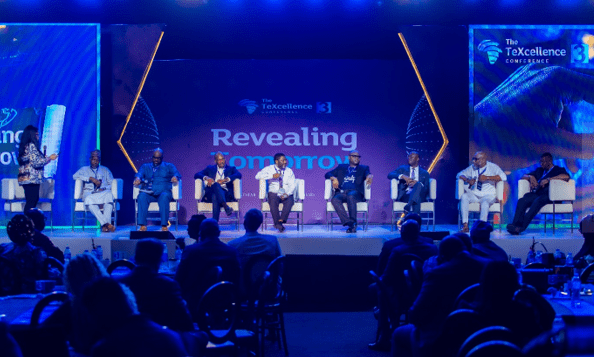By Bernard Yaw ASHIADEY & Ebenezer Chike Adjei NJOKU
The African fintech landscape is poised for a transformative shift from high-risk entrepreneurship to a more structured, platform-based ecosystem, as Chief Executive Officer (CEO) of INNGEN Ghana – an IT business outsourcing service provider – David Gowu, has said.
Speaking during a panel session on the subject ‘Technology and Leadership Conversation panel on the topic, ‘Disruption to Evolution: The Next Chapter in Banking’, at the recently-concluded Texcellence 3.0 conference themed ‘Revealing Tomorrow’ he said the current innovation landscape, which is still fairly nascent, means entrepreneurs take substantial risks with limited abilities to determine the outcomes.
“Our innovators today, are typically people who jump off the cliff with no parachute. And hoping that by the time they land, they will get some parachutes,” he said, adding that while some succeed, others fail.
This high-risk approach to innovation is set to change as the industry matures. As key stakeholders, he noted, “we are emphasizing efforts to implement more systematic approaches to fintech development with regulatory compliance and customer-centric development high on the agenda.”

The proposed framework, as outlined by Mr. Gowu, also the President of the Institute of ICT Professionals Ghana (IIPGH) – begins with a thorough market analysis. This involves conducting market research, discovery, and identifying customer needs before developing an application that solves their problems. He emphasised the importance of considering regulatory requirements throughout the development process.
Platform-based innovation, he added, is gaining traction, with major telecommunications and financial services players already making moves in this direction. However, he stressed that such innovation must occur within a regulated framework, particularly given the sensitive nature of financial services.
The banking sector’s strict regulatory environment presents unique challenges for innovators. “Banking is a sector that is heavily regulated. So for innovators to be able to work in the financial sector, they must also understand regulation and factor in regulation whilst developing their products and applications,” he explained.
Looking ahead, Mr. Gowu, who is also the President of Technology Information Confederation Africa (TICON Africa), predicted significant changes in how financial services are conceived and delivered, arguing that the industry will see multiple new forms of financial services emerging.
The key to unlocking this potential lies in developing robust infrastructure. “When we develop our infrastructure and we secure this infrastructure through regulation and cyber security and data protection, we will then have the flexibility to be able to innovate,” he stated.
Work future and AI
During an earlier presentation on the topic, ‘Empowering the Workforce of Tomorrow: Digital Skills for a Transformative Future’, Mr. Gowu urged African businesses to embrace artificial intelligence (AI) through collaboration rather than competition, positioning the continent to become a global workforce hub as developed nations age.
There, he outlined a vision where Africa’s growing youth population could leverage AI to serve global markets while remaining in their home countries. “We need a handshake between ourselves and artificial intelligence,” Mr. Gowu told delegates, adding, “Whether people are in Ghana, Nigeria, or anywhere else, as long as humans can work efficiently and co-exist with technology, there should be no need for concern.” He further stressed that the transformation of the continent’s workforce should centre on human-AI cooperation.
The stakes are significant. Africa’s population is projected to grow by an additional billion people by 2050, when the continent will host 25 percent of the world’s workforce. This demographic dividend comes as Europe faces an aging crisis.
“Europe is getting old. And they will still live long and they will need people to work. The question is, how are we going to position ourselves to make sure that Ghana and Nigeria take the lead and other African countries follow to now be the workforce of the world,” he quizzed.
However, significant challenges remain particularly with skill development. Mr. Gowu highlighted that current education systems are not adequately preparing African youth for this future. “While many African countries are increasing access to higher education, our educational systems often rely on outdated 20th-century methodologies and curricula,” he said.
His company, INNGEN, is already implementing this vision of AI-human collaboration. “We have a workforce that is sitting in Ghana. We will have a workforce in Nigeria. We will have a workforce in other parts of the world,” he said, describing how workers are being trained to use AI technologies to serve both continental and global markets.
The transformation requires substantial investment in education and skills development. In Ghana alone, about half a million young people graduate yearly, but many lack the required digital skills.
To address these challenges, he advocated for increased focus on science, technology, engineering, and mathematics (STEM) education and critical thinking skills. “We need to be looking at skills that allow people to think critically, look at problems and find solutions,” he said, adding that human capabilities like empathy would remain crucial in an AI-enabled workforce.
The vision extends beyond pure technology skills. “When people can work and earn a decent income, they do not care about whether to jackpot or to stay here. The most important thing is for them to live in a place where they are comfortable and be able to earn a decent income and live their lives,” Mr. Gowu explained.










